Today, by popular demand, Bible Women We Love the Most will explore the stories of two OT women: Sarah and Achsah. You may not have heard of Achsah, yet she was a landmark figure in women’s biblical history. This series so far has looked at favourites Mary of Nazareth, Naomi and Rachel, Noadiah, Abigail, the Daughters of Zelophehad, Ruth, Deborah, Jael and Esther, Huldah and Moses’ Mum, Jochebed.
SARAH, MOTHER OF ALL BIBLE WOMEN
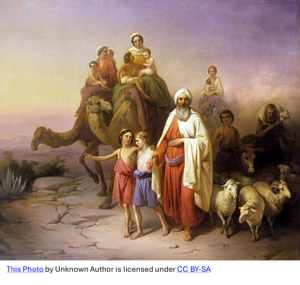
Bobbie says: “I chose Sarah, mother of all Bible women, because her miraculous conception and birth of Isaac in her old age symbolize the power of God to fulfill His promises and the blessings of motherhood, just as he has for my own daughter (who is somewhat younger than Sarah was.)

Sarah’s original name, Sarai, means “princess” in Hebrew. She got her new name after God made a covenant with her husband Abraham, who became the patriarch of Judaism, Christianity, and Islam.
Her new name, Sarah, suggests that she is, “Princess, Mother of Nations.”
God called them to leave their homeland of Ur and journey to the land of Canaan.
INFERTILITY
The Bible emphasizes the prized value of the child a woman is eventually graced to bear after a prolonged period of infertility. Think Rachel, Hannah, Elizabeth… and Sarah.
This is a central theme of her story, because God had promised Abraham he would father many nations and that Sarah would bear him a son, despite her old age. Miraculously, she conceived at around 90 years of age and gave birth to a son, Isaac, meaning, ‘he will laugh’. This name came from Sarah and Abraham’s laughter when a messenger, one of three visiting angels whom Sarah fed lavishly, announced they would have a son.
ISAAC/ISHMAEL
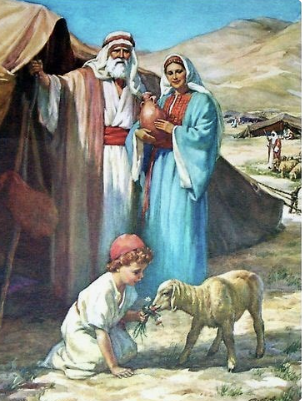
Isaac was the child of promise through whom God’s covenant would continue.
Earlier, however, despairing at her infertility before becoming pregnant with Isaac, Sarah had suggested Abraham sleep with her maidservant, Hagar. He fathered a son by her named Ishmael. Tensions arose between Sarah and Hagar, leading to Hagar and Ishmael’s eventual departure from Abraham’s household, (a whole, other story that begs to be told, going forward).
DEATH
Sarah died in Hebron at the ripe old age of 127. Abraham purchased a plot with a cave where, no doubt, she lies, to this day. She is revered as the matriarch of Judaism, Christianity, and Islam.
ACHSAH: BOLD AMONG BIBLE WOMEN
Gaetane chose Achsah: “She is not just any girl. She carries a different spirit, like her father Caleb, and that makes her one in a million. She models the feminine version of the hero’s journey in the quest for her own land in the promises of God, and as a co-heir with her brothers.”
Achsah SB says of her namesake: “I long to inherit that spirit, to walk with my head held high, to face my own giants with the same unwavering resolve.”
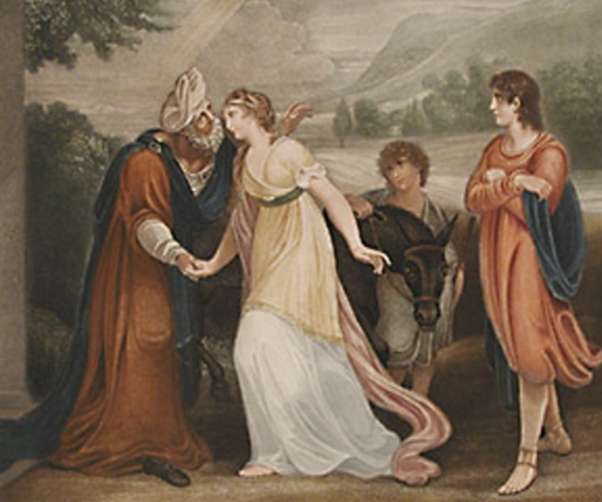
Biblical Achsah’s story is one of inheritance, resourcefulness, and the fulfillment of promises.
CALEB’S DAUGHTER
Achsah was the daughter of Caleb, head of the Tribe of Judah and Joshua’s righthand man. Caleb had been one of the twelve spies sent by Moses to explore the land of Canaan, forty years earlier (Num. 13-14). He was confident then that the Israelites could reclaim the Promised Land, having famously declared, “We can surely do this,” (13:30).
Now, finally they have taken it and shared out parcels of territory for each tribe
Caleb offered Achsah’s hand in marriage to the conqueror of the city of Debir. Othniel, Caleb’s nephew, achieved this feat and claimed Achsah as his reward and became Israel’s first Judge, (Judges 1,3).
WIFE OF OTHNIEL
Achsah urged Othniel to ask her father for land. This may have been a clause of her ketubah (marriage contract), but we are not sure whether they even wrote marriage contracts this early.
It seems likely the land was intended as an inheritance from Caleb for his daughter, which is surprising, since Caleb had a son, Hur, and daughters did not usually inherit land.
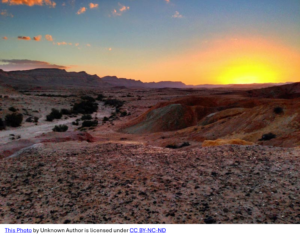
Even more surprising is that Achsah, not satisfied with the apparently arid land she had been given, brazenly went to her father. She got off her donkey, and responded to his question: “What can I do for you?” with:
“Do me a special favour. Since you have given me land in the Negev, give me also springs of water.”
Josh 15:19 / Judges 1:14
Caleb then gave her both upper and lower sites that had springs.
SYMBOLISM
The story of Achsah’s request for land with water springs is often interpreted as representing the importance of seeking blessings and resources from God. Achsah’s boldness in approaching her father to ask for what she needed is also seen as a positive example of initiative and assertiveness that placed her on an equal footing with the men of her time.

Next time: We are pausing this series on The Bible Women We Love the Most to feature a review of Jenny Sanders exciting new book, Polished Arrows. We will return to some New Testament favourites you have chosen after that.

Sign up in the sidebar to receive my weekly newsletters from Israel, as well as receiving first heads up about my new posts here.

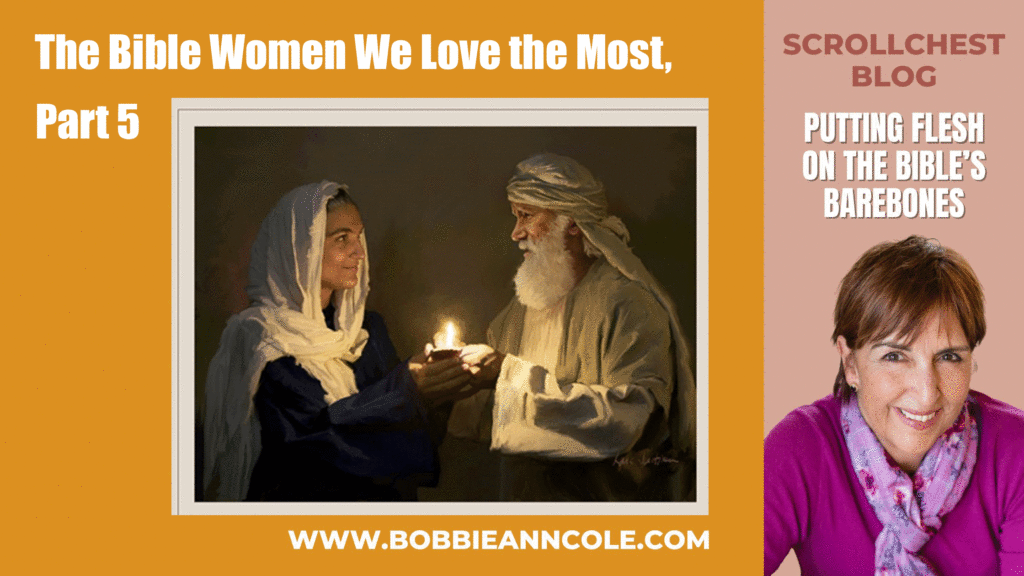
« « The importance of seeking God’s blessings and resources ». A reminder to all women 🙏 and men.
Love this interpretation of Achsah’s mention in the Bible.
Indded, Cheryl, she is far more important than her renown might give us to believe. She was a frontrunner in the equality stakes.
In Achsah’s request for springs of water in the desert I see the landscape of the redeemed in Isaiah35
and even the Samaritan woman at the well.
She asked for physical water and God blesses His people with streams in the desert pointing to the living water of Jesus.
Quoting part of that beautiful passage here for those unfamiliar with it: Water will gush forth in the wilderness
and streams in the desert.
7 The burning sand will become a pool,
the thirsty ground bubbling springs.
In the haunts where jackals once lay,
grass and reeds and papyrus will grow.
8 And a highway will be there;
it will be called the Way of Holiness;
it will be for those who walk on that Way.
The unclean will not journey on it;
wicked fools will not go about on it.
9 No lion will be there,
nor any ravenous beast;
they will not be found there.
But only the redeemed will walk there,
10 and those the Lord has rescued will return.
They will enter Zion with singing;
everlasting joy will crown their heads.
Gladness and joy will overtake them,
and sorrow and sighing will flee away. (Isaiah 35:6-18)
It is most appropriate. And the Samaritan woman who wanted the streams of living water Jesus offered, over dragging herself to and from the well every day.
Thank you for this comment, Alison.